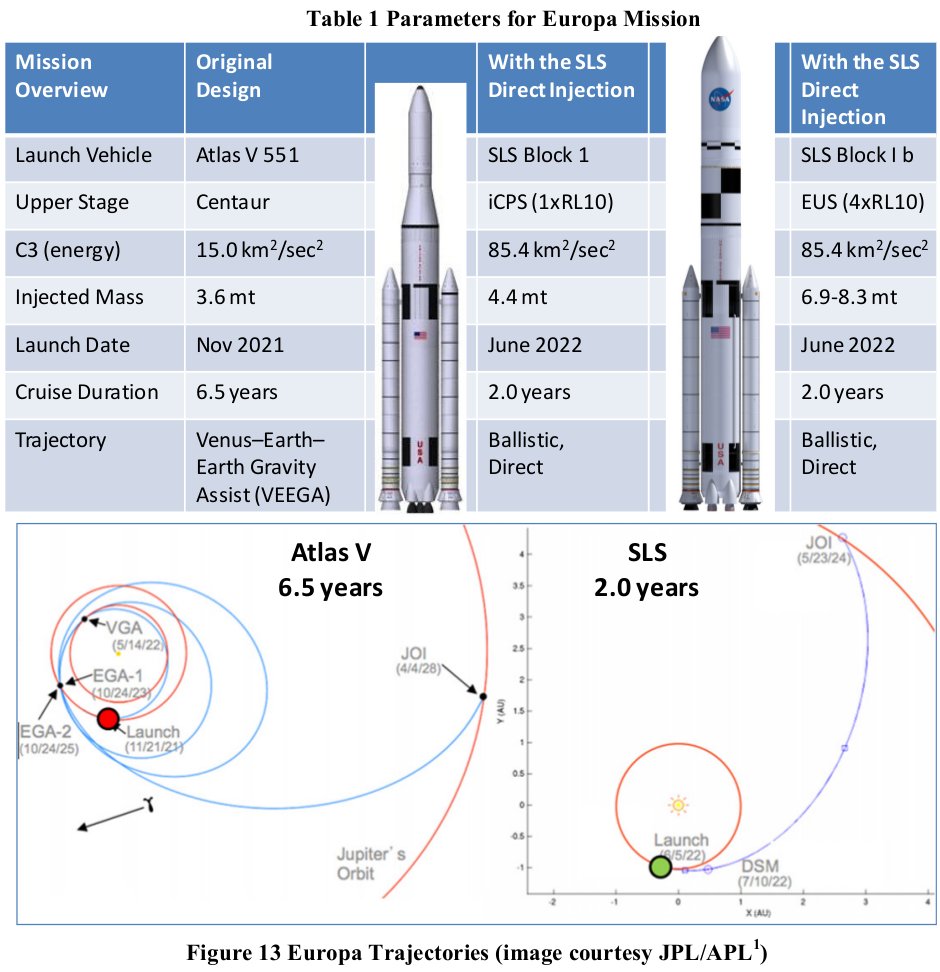What happens when you send a philosopher to Congress. Morons like Barbara Boxer are shown to be morons.
Category Archives: Mathematics
Vivaldi
I may give it a whirl. Not sure if there are rpms for it yet, though. Might have to build it.
The Fastest Man-Made Object Ever
Some of the nuke types over on Twitter have been discussing this. It would have beaten Sputnik to space, but not to earth orbit.
Europa With Falcon Heavy
I was running some numbers, and just got a surprising result. I’m wondering if someone can check my work.
The AIAA paper by Boeing, presented in Pasadena last fall, has a reference mission of 8.3 MT thrown at Jupiter for the fast trip with no gravity assists with the Block 2 cargo version. They specify a C3 of about 85 km^2/s^2. Here’s the table I’m looking at.

When I back that out, I end up with a departure velocity from LEO of about 6.5 km/s. With a stage fraction of 0.1 (that is, the ratio of the stage dry weight to loaded weight) and an Isp of 465 (referencing RL-10), and sixty tonnes in LEO (that’s the latest I’m hearing for FH with the upgraded cores), I can do that mission with a single flight. If we do two flights, I can throw 24 MT. Here’s my spreadsheet. Am I getting something wrong? Because that implies that they could do an even bigger mission with a 130 MT SLS. Here’s my spreadsheet.
[Update a few minutes later]
OK, I do see one slight problem, but I don’t think it affects my results much. I sized the “rubber” stage to the 2nd-stage requirement, so it’s probably a little undersized for the first stage. That is, when I change the payload mass, I get a slightly different propellant load in the first stage, though in actuality it should be independent of that.
[Update a few minutes later]
I’m wondering if the problem they have is that the EUS is oversized for the mission, so it wastes a lot of propellant shoving the parasitic stage mass? If so, that would be kind of hilarious.
But it is also possible that I’ve done the calculation wrong, which is why I’d like more eyes on my work.
[Update a couple minutes later]
D’oh!!
I do see an error. I double the potential energy as well as the kinetic when solving for departure velocity in line 13. BRB.
[Update a few minutes later]
OK, I guess I was wrong when I said I was wrong. Still not seeing the problem, if there is one.
[Update a while later]
I should note that the numbers don’t look obviously wrong, or bother me intuitively. I’m just trying to understand the disparity with the SLS mission, which supposedly has twice the throw weight.
[Late-afternoon update]
Looking at the Wikipedia page for EUS (I know, but it’s usually not a bad source for things like this), mass properties are pretty scarce. All it says is that it can carry 129,000 MT of propellant, which makes no sense, since that’s the throw weight of the SLS, and leaves no margin for structure. So huh. It’s almost like the whole program is a Bravo Sierra jobs program.
[March 28th update]
I just had an email exchange with one of the paper’s authors. They are using the Block 1B configuration, which only has 105 tonne capability. So my numbers seem to be right.
[Bumped]
Commercial Supersonic
Here’s the latest entry. They seem to have persuaded Virgin into buying ten planes.
They don’t seem to be addressing boom, no mention of transcontinental flight. I have a lot of trouble believing they can do trans-Pacific non-stop. But I’d like to find out more.
Climate Prediction
What a concept. Read the concluding sentence.
The Pension Crisis
As I’ve said in the past, if the federal government bails out a state, it should be under the conditions that it revert to territory status until it has demonstrated fiscal responsibility over a long period of time. And in the case of California, it should not be allowed to come back in as a single state. If this requires a constitutional amendment, I’ll bet you could slam one through enough of the more fiscally prudent states pretty quickly.
Commercial Crew
“Building in safety from the ground up.”
Note the theme that safety is the highest priority, and no discussion of how much this is all costing, or how much it’s delaying ending our dependence on Russia (which is part of the cost) in addition to delaying an increase in ISS crew size (which is also part of the cost).
How Inevitable Is Trump?
Not as much as some want us to think.
#ProTip: If you want to have a high probability of stopping Trump, get behind Cruz. If you want to throw the dice, try to get to convention.
— Rand Simberg (@Rand_Simberg) March 7, 2016
[Late-morning update]
Kurt Schlichter has sympathy for the Donaldites.
So do I, but The Donald isn’t their (or anyone else’s) salvation.
Confident Idiots
A long but very interesting piece on the overconfidence of the incompetent, by David Dunning (of Dunning-Kruger fame). For some reason, I think it has some relevance to the Trump phenomenon, and politics in general.
For the record, I have never had a problem claiming my ignorance on a topic.